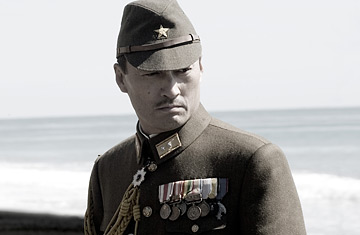
Ken Watanabe as General Kuribayashi in the film Letters from Iwo Jima.
The movie's box office receipts alone would seem to answer Iguchi's question. (Letters was co-produced by Warner Bros. Pictures, a subsidiary of Time Warner, which also owns TIME.) Through last weekend, the Oscar-nominated Letters had grossed just under $40 million, earning it the top spot during the Japanese cinema industry's all-important New Year holiday season. Not bad for a downbeat movie that chronicles one of Japan's bitterest defeats — one that has rarely been the subject of a Japanese film.
Letters comes at a time when yesterday's war is pressing for attention in today's headlines. Prime Minister Shinzo Abe, the country's first leader born after World War II, has announced his intention to revise Japan's pacifist postwar constitution, and he recently elevated its Defense Agency to full cabinet-ministry status. Abe's grandfather Nobusuke Kishi had been a top official in Japan's wartime government (as well as a prominent postwar Prime Minister), and Abe himself has, in the past, fudged the issue of his country's responsibility for the Pacific war. Just how open that question remains in Japan was underscored last year by a lengthy investigation into responsibility for the war conducted by the Yomiuri Shimbun, Japan's biggest newspaper. (Short answer: the Japanese military and government, but not the emperor.) The equivalent exercise in the U.S. would be the New York Times devoting weeks to an investigation of who was at fault in the Civil War.
The rise to power of Abe — widely described as a nationalist before his election last September — had liberal critics fearing a return of the dark days of prewar military rule. That's hardly been the case: Abe has so far proved admirably pragmatic in international affairs, and even the threat of a nuclear North Korea has done little to stir Japan from its accustomed postwar pacifism. To the Japanese soldiers in Letters, war is hell, the same as it is everywhere else. Still, Japan is clearly taking steps to become a normal country with a normal military, and the unfinished legacy of the war still looms.
The problem is less with the U.S. — Tokyo and Washington are closer than ever — but with the rest of Asia, particularly the countries that suffered under Japanese occupation, with which no consensus over the past has been achieved. Japan's military atrocities still enrage Chinese and Koreans, including ones born long after 1945, while many Japanese dispute the scale of their abuses, and see their country as the ultimate victim. Repeated efforts to forge a common view of the war through joint history commissions have gotten nowhere, and more than 60 years after it ended, a misplaced word about the war can still dynamite the region's fragile diplomatic balance.
Clint Eastwood's movie sidesteps the minefield by focusing on a single battle in the Pacific theater. It portrays Japan's soldiers as human, flawed and tragic, and Japanese audiences have no trouble identifying with them as they fight a doomed battle under a hard-driving but caring general (played by star Ken Watanabe) whom many Japanese would probably see as the perfect boss. Letters doesn't shy away from the suicidal warrior ethos that ultimately drove Japan's military to lead the country into obliteration — witness the scene where a lieutenant orders his men to kill themselves with live grenades, and all but one does so. But as the reviewer Aaron Gerow pointed out in the Daily Yomiuri, Letters doesn't truly attempt to grapple with history; unlike its companion movie Flags of Our Fathers, which probed the long-term cost of war and remembrance. Watanabe put it this way in an interview with TIME last month. "This film is not a display of patriotism," he said. "It is a testimony to what war is" — war in its universal immediacy.
As difficult as Letters can be to watch, that fact might make it easier for Japanese audiences to embrace it. They aren't required to ponder the psychic cost of the battle on the survivors — few as there were — nor to wonder at the political mistakes that wrought horror from Manchuria to New Guinea. That's not the film Eastwood wanted to make, and that he chose not to takes nothing away from his accomplishment. But if he had, I doubt that Abe would have walked out of a screening calling it a "very good film" — and that $40 million gross might have come out a bit lighter.
